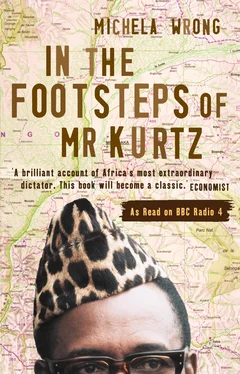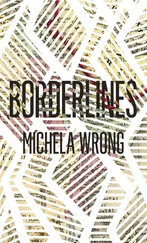While he worked with passionate commitment, he felt unhappy enough about the devastating light his discoveries shed on his former employers to shun the public stage. His first books had been published under a pseudonym. Some, printed by a company set up by his wife, verged on vanity publishing. Resolutely factual, the bare bones on which other, more florid writers – Mr Marchal hoped – would some day base their work, the volumes only featured on the shelves of the largest and most specialised Belgian bookshops. In the absence of active promotion, sales of 700 counted as a good result and Marchal was happy to hand out remaindered stock. ‘I have to tell these things because they are true, I want to put history right. But I cannot promote my message as an ordinary author does. It is too sad,’ he explained. ‘Whatever you do, please don’t present me as a traitor who is trying to bring down my country.’
Marchal had been accused by academic contemporaries studying the era of drawing up a ‘personalised charge sheet’. Indeed, he was near-obsessed with the qualities, or lack of them, of the man he saw as holding the key to Congo’s dark story. Certainly, the huge central African land mass that today occupies 905,000 square miles, nearly eighty times the size of Belgium, its colonial master, would never have been defined as a nation at all had it not been for the determination of the Duke of Brabant to acquire a colony.
Even as a young man, waiting in the wings for his father to die, the man who was to become Leopold II had taken careful note of how England, Spain, Portugal and the Netherlands had all built their power and wealth on a panoply of colonies, using foreign resources to rise above what often seemed the limitations of geography and natural assets.
His country was young, its sense of self-identity distinctly shaky. He was only the second monarch of an independent Belgian state, whose people had staged a revolution in 1830, turning their backs on centuries of Spanish, Austrian, French and Dutch rule. Despite a distinct lack of enthusiasm on the part of the population, he was determined to use a colony to transform his tiny country, divided by religion and language, into a world power commanding respect.
‘No country has had a great history without colonies,’ Leopold wrote to a collaborator. ‘Look at the history of Venice, of Rome and Ancient Greece. A complete country cannot exist without overseas possessions and activity.’ Scouring the world, he had looked at China, Guatemala, Fiji, Sarawak, the Philippines and Mozambique as possible candidates, but had been stymied at every turn. Then, cantering to the rescue like a moustachioed crusader, had come Henry Morton Stanley.
Stanley was a poor Briton who had emigrated to America, where he had reinvented himself as a war correspondent known for his racy copy and fearlessness under fire. An illegitimate child, he had been abandoned by his mother and sent to the workhouse, circumstances that left him with a deep need to prove himself. Fated to spend his life in a swirl of controversy, Stanley had first seized the public’s imagination by penetrating darkest Africa in 1871 and tracking down David Livingstone, the British missionary who had gone missing five years earlier. Their legendary meeting was one of the great journalistic scoops of all time.
In 1877 he pulled off an even more impressive feat. Proposing to settle the dispute that had festered for years between British explorers John Speke and Richard Burton over the source of the Nile, he set off once more from Zanzibar, tracing the course of the Lualaba river for 1,500 miles. Braving rapids, ambushes, smallpox and starvation, he followed the river, emerging at the Atlantic Ocean after a journey that lasted nearly three years. He had not only established that the Lualaba had no connection with the Nile, which he had shown to spring from Lake Victoria, he had also opened up a huge swathe of central Africa until then known only to the ‘Arab’ merchants (in actual fact Swahili-speaking, Moslem traders from Africa’s east coast) to greedy Western eyes.
In the books Stanley wrote after each extraordinary trip he showed a near-obsession with the dangers posed by perspiration and sodden underwear, which he blamed for malarial chills. But his eccentricities did not prevent him from accurately sizing up the potential of the land he had passed through. Its forests were full of precious woods and ivory-bearing elephants. Its fertile soils supported palm oil, gums and, most significantly, wild rubber, about to come into huge demand with the invention of the pneumatic tyre. Its inhabitants presented a ready market for European goods and, once the rapids were passed, the river offered a huge transport network stretching across central Africa.
Stanley was far from being the first white man to reach this part of central Africa. Late fifteenth-century emissaries from Portugal, looking for the fabled black Christian empire of Prester John, had stumbled on the Kongo kingdom, a Bantu empire spreading across what is today northern Angola, western Congo and edging into Congo-Brazzaville.
A feudal society led by the ManiKongo, this kingdom proved surprisingly open to the arrival of the white man, perhaps encouraged by a spiritual system which identified white, the skin colour of these strange visitors, as sacred. It had welcomed missionaries, embraced Christianity and entered into alliance with the Portuguese. But by the time Stanley was tracing the course of the river, the Kongo kingdom had been in decline for more than two centuries, devastated by endless wars of succession, attacks by hostile tribes and, above all, the flourishing slave trade.
Although it was clearly in his interest to play up the horrors of what he found, for it made the alternative of colonial subjugation seem so much more attractive, Stanley appears to have been genuinely horrified at the damage the ‘Arabs’ had wrought along the river.
‘The slave traders admit that they have only 2300 captives in their fold, yet they have raided through the length and breadth of a country larger than Ireland, bearing fire and spreading carnage with lead and iron,’ he reported in The Congo and the founding of its free state. ‘Both banks of the river show that 118 villages, and forty-three districts have been devastated, out of which is only educed this scant profit of 2300 females and children and about 2000 tusks of ivory … The outcome from the territory with its million of souls is 5000 slaves, obtained at the cruel expense of 33000 lives!’
But his hopes that Britain, his mother country, would seize the opportunities presented were dashed. With London refusing to take the bait, King Leopold II stepped in. One of the last pieces of unclaimed land in a continent being portioned off by France, Portugal, Britain and Germany, Congo fitted his requirements perfectly. Leopold recruited Stanley to return to the Congo, set up a base there and establish a chain of trading stations along the navigable main stretch of the river which would allow the European sovereign to claim the region’s riches.
Stanley found himself in a race against Count Pierre Savorgnan de Brazza, a naval officer who was energetically signing up local chiefs on France’s behalf. With the northern shoreline lost to him – hence the eventual establishment of French Congo, with Brazzaville as its capital – Stanley had to content himself with the southern shore of the river, pushing his treaties on hundreds of chieftains. Leopold’s insignia – the gold star on a blue background later, bizarrely, revived by the anti-colonial Laurent Kabila – was raised over village upon village.
Further exploration confirmed Stanley’s first impressions of vast natural riches just waiting to be exploited. ‘We are banqueting on such sights and odours that few would believe could exist,’ he wrote after another trip up river. ‘We are like children ignorantly playing with diamonds.’
Читать дальше












